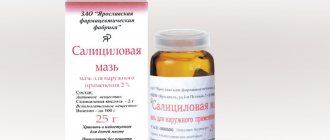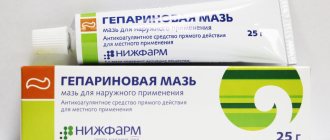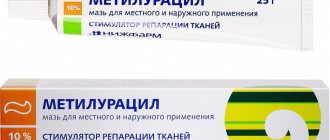Zinc ointment is one of the best remedies in the fight against diaper rash, excessive sweating and acne. It provides the necessary skin care, disinfecting and protecting from external adverse factors. The low price makes it accessible to consumers, and the low percentage of allergic reactions gives it the right to be called safe for babies.
How to use zinc ointment
Zinc ointment is used in pediatrics as a protective agent against diaper rash. In addition, it is recommended to lubricate the baby's delicate skin under the diaper every time after bathing. Zinc creates a reliable barrier that protects children's skin from constant contact with urine and loose stool. By applying zinc ointment to the buttocks daily, you can protect your baby from diaper dermatitis.
The disinfecting effect of the drug is used when treating wounds. By applying the composition to abrasions, you can avoid infection, prevent acidification of the damaged surface, and speed up the process of skin regeneration.
The main indications are:
- diaper rash;
- scratches;
- dermatitis;
- eczema;
- cuts.
In addition, zinc ointment is used to care for the elderly and immobile patients. Treatment of bedsores slows down their spread and disinfects, which eliminates the risk of secondary infections.
Hormonal ointments
When there is no positive dynamics from the use of non-hormonal ointments, specialists resort to hormonal drugs. Their main components are glucocorticosteroids - hormones that are produced by the adrenal glands in the human body. The mechanism of action of such drugs is based on the effect on the metabolism of proteins and carbohydrates. Hormonal ointments restore the level of cortisone, with a deficiency of which the body becomes unable to cope with inflammatory processes.
Depending on the degree of impact on the skin, hormonal ointments are divided into several categories:
- weak,
- average,
- strong,
- very strong.
The latter are used only for the most severe forms of dermatitis, so they are never prescribed first. Examples of hormonal ointments:
- Hydrocortisone,
- Celestoderm,
- Akriderm,
- Advantan,
- Elokom,
- Dermovate,
- Fucicort.
The main disadvantages of hormonal ointments in the treatment of dermatitis:
- Addiction. The main disadvantage is that over time the ointment ceases to be effective for treating a particular patient. The same active components of hormonal ointments are addictive.
- Side effects. Due to their hormonal nature, such ointments have many unpleasant side effects. They appear when used incorrectly or for too long. In severe cases, skin atrophy and even adrenal insufficiency may develop.
- Presence of withdrawal syndrome. As in the case of non-hormonal ointments, when using hormonal ointments, you cannot interrupt the course and skip application. The withdrawal syndrome manifests itself especially strongly when abruptly stopping a hormonal drug. This means that symptoms of dermatitis may suddenly return. For this reason, hormonal drugs are discontinued gradually, reducing the dose and number of applications.
Hormonal products can claim to be the best ointments for dermatitis, but only in terms of effectiveness. Yes, they help cope with the symptoms of the disease faster than non-hormonal ones. But at the same time, they can have a short-term effect, require very strict adherence to the treatment regimen, have side effects and a large list of contraindications, which includes:
- venereal diseases;
- tuberculosis;
- pregnancy and lactation;
- herpes;
- bacterial or fungal skin lesions.
How does zinc ointment work on acne?
Use in cosmetology has shown its effectiveness against acne. Skin rashes caused by excessive secretion from the sebaceous glands may disappear if zinc ointment is used correctly:
- Cleanse skin of makeup and impurities.
- Wipe skin dry.
- Apply zinc ointment to the area affected by acne.
- Leave overnight.
Zinc will dry out areas of the skin and prevent the sebaceous glands from producing sebum.
Analogues of the drug
If you cannot smear the damaged epidermis with zinc oxide for some reason, you can replace it with an analogue. Generics are available in different dosage forms and are sold without a prescription.
| Crema | Ointments | Suspensions | Pastes |
| Desitin | Sulfur-zinc | Tsindol | Zinc, 25% |
| Diaderm | Salicylic-zinc | ||
| Sudocrem |
Analogues differ in composition and state of aggregation, but the active substance is the same. During pregnancy, chickenpox, herpes, severe burns, infancy, acute psoriasis or eczema, zinc ointment and its analogues are used only as recommended or after consultation with a doctor.
Do I need to wash off zinc ointment from my face?
The constant presence of zinc on the skin of the face can lead to dryness and flaking. However, this depends on the individual characteristics of the sebaceous glands. If pathological activity is noted, the zinc ointment may not be washed off, but in this case there is no need to apply foundation and other cosmetics on top of it: firstly, this will clog the pores, and secondly, the compositions of some products may react with zinc, which may lead to chemical reactions between components.
If the ointment is not washed off during the day, be sure to cleanse the skin by washing before the next application. Otherwise, the accumulation of daytime dust in the pores with ointment residues can give rise to a new skin problem.
What does Zinc ointment help with in cosmetology?
Due to its drying, anti-inflammatory and antimicrobial properties, salicylic-zinc paste can be successfully used in cosmetology for:
- treatment of acne and acne;
- acne prevention;
- accelerating the healing of herpetic rashes;
- drying out allergic rashes.
Salicylic paste does not help with wrinkles, dark spots and bags under the eyes; it simply does not contain components that can be expected to have positive effects on these problems. Moreover, applying this drug to the area around the eyes causes dryness and irritation of the delicate skin in this area, which can lead to the formation of wrinkles.
Salicylic-zinc paste for acne and other rashes should not be used in combination with other medicinal formulations that have a drying effect - talkers, gels. Their simultaneous use can lead to overdrying of the epidermis and even more intense secretion of sebum.
Before starting a course of treatment, you need to check whether the drug will cause allergic reactions on the skin. To do this, apply a little product to the inner surface of the forearm. After half an hour, inspect the application site. If no redness or rash appears, no burning or itching is felt, then the drug can be used without fear.
For acne
The active ingredients of salicylic-zinc paste destroy bacteria that cause acne, relieve inflammation, dissolve the upper stratum corneum of the skin, promoting the release of pus, and dry out the source of inflammation, accelerating healing. The basic rules for using this tool are as follows:
- The drug leaves white marks on the skin, so you need to use it while you are at home, it is best to do this at night.
- Before applying the product, you must remove makeup and thoroughly cleanse your face by washing with soap or gel.
- After the skin has completely dried, the drug is applied pointwise to the pimples, lightly rubbing it into the problem area.
- There is no need to wash off the product after it dries; it should remain on the skin until the morning.
- In the morning you need to wash your face with soap, after which you can reapply the product. You can repeat this procedure up to 5 times during the day.
Salicylic-zinc paste is available in jars and tubes. It is better to give preference to the second type of packaging, since the tube protects the drug from contact with air and oxidation.
Anti-acne paste
For acne, salicylic-zinc paste is used in the same way as for treating acne:
- Before going to bed, thoroughly cleanse the face by removing makeup and washing with soap.
- After letting the face dry, apply the drug to problem areas, lightly rubbing it into the skin.
- After the paste has dried, do not remove it, but leave it on the face so that it acts all night.
- In the morning, wash off the product with warm water and soap.
- While at home, the paste can be applied to acne up to 5 times a day.
To get rid of acne, treatment must be comprehensive; in addition to the external use of external agents, it is also necessary to take vitamin and mineral preparations and special dietary supplements.
For oily skin
If you are prone to pimples and acne, which is typical for oily skin, salicylic-zinc paste can be used for preventive purposes. This is especially true for the fair sex, whose skin problems worsen on certain days of the menstrual cycle. To prevent the “red days of the calendar” from being marked by the appearance of acne, it is recommended to make preventive masks. For this:
- After removing the makeup and washing with soap, a thin layer of the product is applied to dry skin on areas with oily skin, where rashes appear most often - on the chin, forehead, nose.
- The product is left for 15-20 minutes, after which it is washed off with warm water.
- The procedure is repeated twice a day for 4-5 days.
Due to the pronounced drying effect, it is necessary to avoid contact with the periorbital area, where the skin is dry and thin.
For herpes and allergic rashes
Salicylic-zinc paste accelerates the healing of herpetic rashes. It is especially effective if you start using it at the first symptoms of herpes - the appearance of itching on the lips. The problem area should be lubricated with the drug 2-3 times a day, making sure that the product does not get into the mouth.
Antihistamines help relieve allergic reactions, and to quickly get rid of skin manifestations of allergies, you can use salicylic-zinc paste. It will dry out the rash and eliminate inflammation, which will contribute to the rapid disappearance of this symptom. Apply a thin layer of the drug to the affected areas, leave for half an hour, and then wash off with warm water.
Contraindications
The ointment is not used to treat skin diseases in patients prone to allergic reactions to the components of the drug.
Zinc ointment is not applied to the mucous membranes of the mouth. Once zinc enters the bloodstream through the esophagus, it can cause poisoning, which can lead to convulsions, allergic skin reactions, nausea, vomiting and dizziness. Exceptions may be the mucous membranes of the anal ring and foreskin, where the ointment can be applied to relieve the inflammatory process, accelerate the healing of cracks and disinfect the surface.
Indications and contraindications for use
The product is dispensed without a doctor's prescription. It is used by independent decision for non-dangerous pathologies and according to medical recommendations. The cream is used for a wide range of diseases and has almost no contraindications.
Indications
Among the indications for the use of zinc ointment:
- all types of dermatitis (including in children);
- eczema;
- diaper rash;
- bedsores;
- allergy rashes;
- psoriasis;
- herpes;
- acne;
- burns;
- small cuts or wounds.
Sometimes it is used in cosmetology. Most often, to combat acne locally, acne scars. Cosmetologists are against the use of cream to combat wrinkles or age spots.
Contraindications
In most cases, zinc ointment is safe. Cannot be used in cases:
- on mucous membranes if they are inflamed;
- increased dryness of the epidermis;
- skin problems, frequent formation of acne and blackheads.
People with individual intolerance to zinc or petroleum jelly are also not recommended to apply it. In rare cases, allergy sufferers may experience a reaction to the drug.
How to use zinc ointment for sweat
Excessive sweating is a problem that zinc ointment helps combat. Violation of the function of thermoregulation leads to excessive production of sweat by the glands, due to which the body tries to reduce body temperature. Zinc ointment does not affect the center of thermoregulation, however, it can reduce the activity of the sweat glands, thereby reducing the amount of sweat produced.
It should be noted that the sweat produced by humans is odorless. The waste products of bacteria that multiply in the armpits, which contain a favorable environment for the proliferation of microorganisms, smell. Zinc ointment, having an antiseptic effect, reduces the rate of bacterial growth, thereby eliminating unpleasant odors.
How to identify a spoiled drug
In order to identify a spoiled product, first of all, you need to look at its expiration date . After all, even if visually the ointment has the correct consistency and color, but the expiration date has expired, then it can no longer be used. This is due to the fact that side effects appear at this time. Most often, such adverse consequences are a variety of allergic reactions, diagnosed through the detection of skin rashes and itching.
You can visually determine the unsuitability of a medicine by its appearance . For example, this is obvious when the color darkens. In addition, an important sign of deterioration of the drug is the separation of its consistency: when the more liquid part flows out first. It is also possible that the smell may change to a stronger one.
If such signs appear, the ointment should under no circumstances be used for medicinal purposes and must be discarded.







